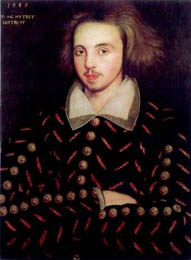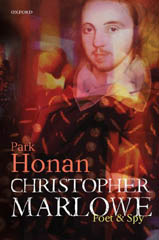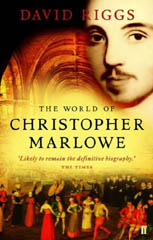Park Honan
Marlowe’s World
 Other than the literary works he created – a few celebrated plays, some translations of Ovid, one long mythological-erotic poem and one surviving lyric poem – Marlowe committed to posterity very little. All we know about him are the barest details of his life.
Other than the literary works he created – a few celebrated plays, some translations of Ovid, one long mythological-erotic poem and one surviving lyric poem – Marlowe committed to posterity very little. All we know about him are the barest details of his life.
David Riggs in The World of Christopher Marlowe is quite emphatic about the dearth of biographical information that is available to us, and writes, ‘he has left us no first-person utterances behind for us to interpret (the sole exception being a cryptic Latin dedication published six months before his death.) The facts of his adult life are few, scattered and of doubtful accuracy. Only one of his works was published during his lifetime, and his name appears nowhere on the text. Despite his lengthy criminal record, Marlowe never went to trial, apart from two brief hearings. He was never convicted of anything. All the evidence about his mutinous cast of mind sits at one remove from his own voice. It consists of reported speech transcripts by informants, observations by unfriendly witnesses, and passages drawn from his plays. Sceptics rightly insist that the atheist, sodomite, spy, and insurrectionist exists only in these documents. He is an irretrievably textual being.’
In unfolding Marlowe’s personal history, Riggs focuses on the institutions that ‘taught Marlowe what transgression was’ and does a convincing job in revealing the relationship between ‘literary greatness’ and ‘social truancy.’ Building on the work of more recent scholarship, and having dismissed as utterly unhelpful the ‘could a bad man become a great writer?’ argument, Riggs, along with the New Historicists, shows that ‘Marlowe’s writing voiced the aspirations of blasphemers, sodomites, foreigners, unemployed scholars and the mutinous poor of Renaissance England.’ Although Riggs does begin to undo the silence surrounding the life and death of Christopher Marlowe, and does answer, in part, ‘who was Marlowe?’, the question remains.
 In relation to what we know or can know about the poet and dramatist, in Christopher Marlowe, Poet and Spy, Park Honan takes a radically different view from Riggs, and contends that ‘the known biographical facts about Marlowe … are surprisingly many’, though he valiantly acknowledges that ‘the difficulty of assimilating [them] can impede our understanding of him.’ However, what Honan bases his work on is more in the nature of data, or strands of data, raw information that requires a high level of processing before it becomes useful. This said, Honan skilfully draws together these strands in his biography.
In relation to what we know or can know about the poet and dramatist, in Christopher Marlowe, Poet and Spy, Park Honan takes a radically different view from Riggs, and contends that ‘the known biographical facts about Marlowe … are surprisingly many’, though he valiantly acknowledges that ‘the difficulty of assimilating [them] can impede our understanding of him.’ However, what Honan bases his work on is more in the nature of data, or strands of data, raw information that requires a high level of processing before it becomes useful. This said, Honan skilfully draws together these strands in his biography.
My own take on this is that there are, in effect, few hard facts about Marlowe that have come down to us, and that this does indeed qualify as a dearth of biographical information. Notwithstanding, the non-availability of the usual material that biographers normally have at their disposal in order to fashion their work has not prevented these two distinguished literary historians from recently publishing extensive biographies of Marlowe, both meticulously researched and well-presented. Perhaps not surprisingly, each writer covers very similar ground, neither adventurously strays from a strict chronological charting of the life, and both provide masses of rich detail about Marlowe’s times. As a consequence, the social history element is much more dominant than the literary-biographical. Given the paucity of information, this is inevitable.
Both biographies describe at great length Marlowe’s Canterbury and its history, the poet’s parentage and family background, local trade, economics and politics, and his schooling. Showing virtuoso skills in research methodology, both demonstrate how systematically they have ransacked all available sources, and their descriptions of Marlowe’s Cambridge years are truly meticulous. The chapters devoted to this period of his education are so detailed that they could well stand alone as historical studies of the university and its curriculum in early Elizabethan England. Because these studies are intended principally as biographies, the dramatic and poetic career of Marlowe is to some extent subordinated. His literary career is by no means ignored, or relegated to a poor second place, and Riggs, slightly more so than Honan, concerns himself equally with the murkier and the more transgressive aspects of the man and his ‘odious moral reputation.’ Riggs carefully examines the claims that Richard Baines, a fellow-spy, and Marlowe’s traducer, made against the poet to the Privy Council: that he was a proselytising atheist, a counterfeiter, and a consumer of ‘boys and tobacco’, though the final note that reached the eyes of Queen Elizabeth had excised from it the famous line about boys and baccy. Three days after the Queen commanded that the charges of atheism be ‘prosecuted to the full’, Marlowe was killed, in a pub-brawl in Deptford, by one Ingram Frizer, with a twelve-penny dagger. Following his death, a coroner’s inquest was convened and the verdict of the jury duly recorded. The murderer claimed he had acted in self-defence, and within the space of a month had received a pardon from Elizabeth. But concerning the actual motive for the murder of Marlowe, the jury is still out.
 Both studies consider at length Marlowe’s Cambridge years and his careers as dramatist, spy and counterfeiter. On the question of his sexuality, Riggs and Honan for good reason, are less expansive. Honan attends to it in a few paragraphs: ‘the matter of his sexuality is more elusive, if only because in a strict sense, there were no homosexuals in the realm; homosexuality is a modern concept’, and discusses briefly aspects of the homo-erotic in Marlowe’s work. Riggs mentions the practice of bed-sharing with same-sex bedfellows, but maintains that, ‘while bed-sharing occurred across the entire spectrum of Elizabethan society, it took on a pedagogical cast at Oxford and Cambridge.’ Because we have no information at all about Marlowe’s sexuality or his predilections, Riggs is wise to refuse to speculate. He writes, ‘the question of whether or not Marlowe was a homosexual is misleading. Marlowe’s contemporaries regarded sodomy as an aspect of seditious behaviour rather than a species of person.’ He does make something of a concession, however, ‘since the search for Marlowe’s innate sexual identity leads nowhere, consider instead the simple question of his living arrangements. By the time Marlowe began to write, he had spent the better part of his adolescent and adult life at school and university, where … he probably shared his bed with other boys and men. Whatever his sexual preferences, he could expect to remain in this situation until prosperous enough to support a wife and children. His endemic poverty and early death ultimately precluded that outcome. In the glimpses of his domestic life after Cambridge, he is always sharing a room with a same-sex partner. At the turn of the century, [in 1600] he appeared on a published list of Modern and extant poets that have lived together. Unless Marlowe was celibate, the readiest outlet for his own sexual desires lay with other men.’
Both studies consider at length Marlowe’s Cambridge years and his careers as dramatist, spy and counterfeiter. On the question of his sexuality, Riggs and Honan for good reason, are less expansive. Honan attends to it in a few paragraphs: ‘the matter of his sexuality is more elusive, if only because in a strict sense, there were no homosexuals in the realm; homosexuality is a modern concept’, and discusses briefly aspects of the homo-erotic in Marlowe’s work. Riggs mentions the practice of bed-sharing with same-sex bedfellows, but maintains that, ‘while bed-sharing occurred across the entire spectrum of Elizabethan society, it took on a pedagogical cast at Oxford and Cambridge.’ Because we have no information at all about Marlowe’s sexuality or his predilections, Riggs is wise to refuse to speculate. He writes, ‘the question of whether or not Marlowe was a homosexual is misleading. Marlowe’s contemporaries regarded sodomy as an aspect of seditious behaviour rather than a species of person.’ He does make something of a concession, however, ‘since the search for Marlowe’s innate sexual identity leads nowhere, consider instead the simple question of his living arrangements. By the time Marlowe began to write, he had spent the better part of his adolescent and adult life at school and university, where … he probably shared his bed with other boys and men. Whatever his sexual preferences, he could expect to remain in this situation until prosperous enough to support a wife and children. His endemic poverty and early death ultimately precluded that outcome. In the glimpses of his domestic life after Cambridge, he is always sharing a room with a same-sex partner. At the turn of the century, [in 1600] he appeared on a published list of Modern and extant poets that have lived together. Unless Marlowe was celibate, the readiest outlet for his own sexual desires lay with other men.’
Riggs also offers some amusing information about Marlowe’s family. It seems that brawling, fighting and general hell-raising were in their blood. Two of Marlowe’s three sisters included among their accomplishments libelling, whoring, blaspheming and common assault. Today, Marlowe and his brawling siblings would probably receive ASBOs and get a sensational write-up in the Sun or the Mirror, after which they would appear on TV – Anne and Dorothy on Trisha, and Christopher on Celebrity Big Brother.
The two biographies under consideration are welcome additions to Marlowe studies. To me, Riggs is marginally the more engaging writer. He brings considerable vitality to his account, which, however, is not novelistic, and certainly not journalistic. Honan is more academic in tone – his study targets a more academic audience. Both equally deserve to be read.
Christopher Marlowe, poet and spy, Park Honan, Oxford University Press (ISBN 0198186959 HBK £25).
The World of Christopher Marlowe, David Riggs, Faber (ISBN 0571221602 PBK £9.99).
© Michael Lister 2006

Comments